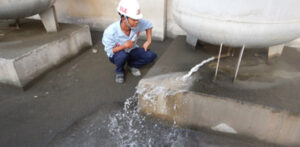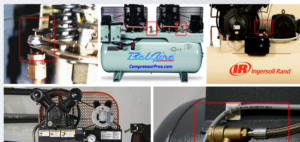Optimizing Your Air Compressor’s Performance: The Ultimate Guide to Selecting Oils and Lubricants
In the world of industrial air compressors, two critical factors play a pivotal role in ensuring peak performance, energy efficiency, and equipment longevity: proper lubrication and advanced control systems. This comprehensive guide explores how to select the best lubricant for your air compressor and how integrating a Compressor Controller can significantly enhance your system’s overall performance.
Selecting the Ideal Lubricant for Your Air Compressor
Choosing the right lubricant is fundamental to maintaining your air compressor’s health and efficiency. Here are the key factors to consider in your selection process:
- Compressor Type and Design Different compressor types have varying lubrication requirements:
- Reciprocating (piston) compressors typically use standard compressor oils
- Rotary screw compressors often require specialized synthetic lubricants
- Oil-free compressors use special food-grade lubricants for their bearings
Always consult your compressor’s manual for manufacturer-specific oil recommendations.
- Operating Conditions Environmental factors significantly impact lubricant performance. Consider:
- Ambient temperature range
- Humidity levels
- Presence of contaminants
- Duty cycle (continuous vs. intermittent use)
- Installation location (indoor vs. outdoor)
Harsh conditions may necessitate synthetic oils with superior thermal stability and oxidation resistance.
- Viscosity Proper viscosity is crucial for optimal lubrication. Common grades include:
- ISO 32 for colder environments
- ISO 46 for moderate climates (most common)
- ISO 68 for hot environments
Choose a viscosity appropriate for your operating temperatures and compressor specifications.
- Oil Types The main categories are:
- Mineral oils: Cost-effective but limited lifespan
- Synthetic oils: Better performance and longevity, but more expensive
- Semi-synthetic blends: Balance of performance and cost
For most industrial applications, full synthetic oils offer the best overall value.
- Key Oil Properties Look for these beneficial characteristics:
- High oxidation resistance
- Excellent thermal stability
- Low foaming tendency
- Good water separation
- Effective rust and corrosion protection
- Extended drain intervals
Premium synthetic oils typically excel in these areas.
- Food-Grade Oils For food, beverage, or pharmaceutical applications, use specially formulated food-grade lubricants that meet regulatory standards.
- Manufacturer Recommendations Always follow the compressor manufacturer’s guidelines to maintain warranty coverage.
- Oil Analysis and Changes Implement regular oil analysis to monitor lubricant condition. Base oil changes on analysis results rather than fixed intervals to optimize lubrication and avoid unnecessary changes.
Enhancing Performance with Compressor Controllers
While proper lubrication is essential, integrating a Compressor Controller can significantly optimize system performance. These advanced control systems work in tandem with your chosen lubricant to enhance overall efficiency:
- Temperature Management: Controllers monitor compressor temperature, activating cooling systems as needed. This helps maintain optimal oil temperature, preserving lubricating properties and extending oil lifespan.
- Run Time Optimization: By managing start/stop cycles and run times, Controllers prevent unnecessary wear on lubricated components, maximizing lubricant effectiveness.
- Moisture Control: Automated moisture management reduces water contamination in compressed air, which can degrade oil quality over time.
- Performance Monitoring: Continuous tracking of key metrics allows early detection of lubrication-related issues, enabling proactive maintenance.
- Adaptive Control: Machine learning algorithms adapt to specific operating conditions, optimizing compressor performance and potentially extending oil life.
- Remote Monitoring: For models with remote capabilities, operators can monitor lubrication-related parameters from afar, ensuring timely maintenance.
Conclusion
The synergy between proper lubrication and advanced control systems is key to maximizing air compressor efficiency and longevity. By carefully selecting a high-quality lubricant and integrating a Compressor Controller, operators can create a system that optimizes performance, extends equipment life, and minimizes maintenance costs. This integrated approach represents the cutting edge in compressed air system management, offering significant benefits in terms of reliability, energy efficiency, and cost-effectiveness.
Bibliography:
- Air Compressor Products, Inc. (2019). Operating and Maintenance Instructions: Climate Control/Industrial. Jacksonville, FL: Air Compressor Products, Inc.
- Bloch, H. P. (2000). Practical Lubrication for Industrial Facilities. Lilburn, GA: The Fairmont Press.
- Fluid-Aire Dynamics. (2021). What Is the Optimal Temperature Range for a Compressed Air System? Retrieved from https://fluidairedynamics.com/optimal-temperature-range-compressed-air-system/
- SAM Controllers. (2024). Compressor Controller Quick Start Guide. Pittsboro, NC: SAM Controllers.
- Saidur, R., Rahim, N. A., & Hasanuzzaman, M. (2010). A review on compressed-air energy use and energy savings. Renewable and Sustainable Energy Reviews, 14(4), 1135-1153.
- Mousavi, S., Kara, S., & Kornfeld, B. (2014). Energy efficiency of compressed air systems. Procedia CIRP, 15, 313-318.
- U.S. Department of Energy. (2003). Improving Compressed Air System Performance: A Sourcebook for Industry. Washington, DC: Office of Energy Efficiency and Renewable Energy.
- Atlas Copco. (2021). Compressed Air Manual (8th ed.). Nacka, Sweden: Atlas Copco AB.
- Kaeser Compressors. (2022). Guide to Compressor Oils and Lubricants. Fredericksburg, VA: Kaeser Compressors, Inc.
- Ingersoll Rand. (2020). Air Compressor Lubrication Best Practices. Davidson, NC: Ingersoll Rand Inc.



